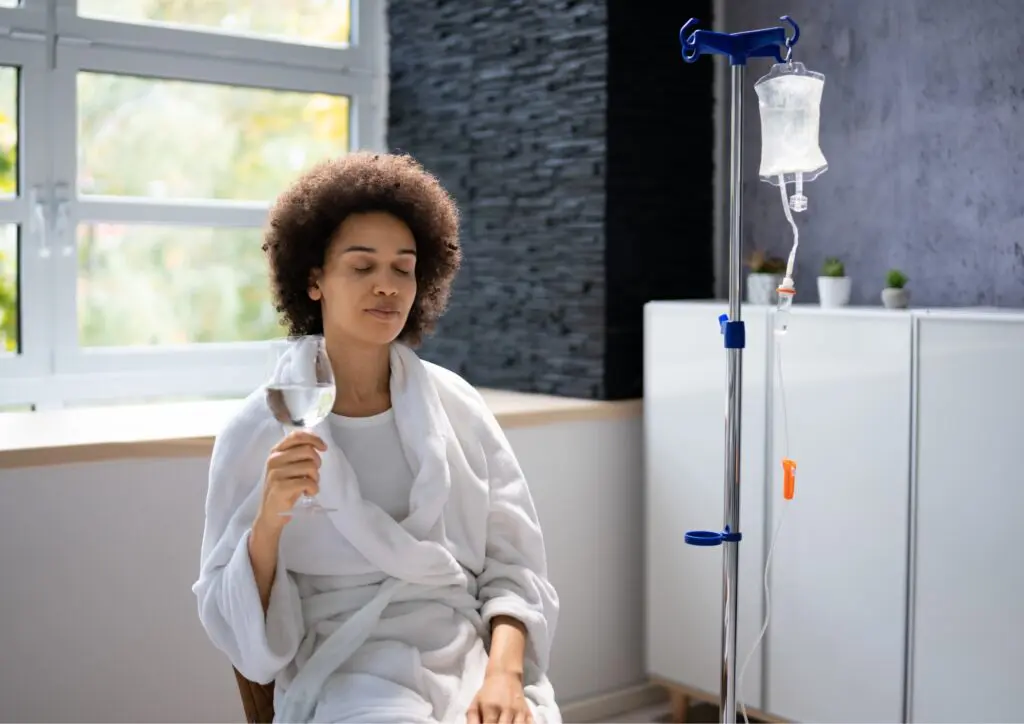In today's fast-paced world, the importance of a good night's sleep is often underestimated. Many of us find ourselves sacrificing sleep in favour of longer work hours, social activities, or screen time, not realising the profound impact this can have on our overall health. Sleep is a fundamental aspect of our well-being, influencing a wide array of physiological and psychological processes. From regulating stress hormones to boosting the immune system, adequate sleep is crucial for maintaining optimal health.
However, achieving quality sleep can be challenging. Factors such as stress, poor diet, and environmental influences often disrupt our sleep patterns, leaving us feeling tired and unrefreshed. This is where IV Vitamin Therapy comes in. By providing essential vitamins and minerals directly into the bloodstream, IV therapy offers a powerful solution to enhance sleep quality and support overall wellness.
In this blog, we will explore why sleep is so important and how IV Vitamin Therapy can play a vital role in helping you achieve better sleep. We will delve into the specific nutrients that promote restful sleep and provide practical tips to improve your sleep hygiene. Whether you struggle with occasional sleeplessness or chronic insomnia, understanding the benefits of IV therapy can help you reclaim the restorative sleep your body needs. Let’s dive into the transformative power of sleep and how you can enhance it with the right nutritional support.
Jump to...
Why Is Sleep So Important?
Sleep is a cornerstone of our health and well-being, playing a vital role in various physiological and psychological processes. It regulates stress and growth hormones like cortisol, which are essential for tissue repair, muscle growth, and overall physical recovery. Adequate sleep also strengthens the immune system, boosting your body’s ability to fend off infections and diseases. Moreover, it helps regulate appetite by affecting the hormones that control hunger and satiety, thus preventing overeating.
Quality sleep is crucial for cognitive functions, enhancing memory, attention, and problem-solving skills. It is linked to a lower risk of mental health issues, including depression and anxiety, thereby promoting emotional stability and reducing mood swings. Consistent, quality sleep is also critical for cardiovascular health, reducing the risk of heart disease, high blood pressure, and stroke by lowering stress and inflammation.
Sleep plays a significant role in metabolic health, influencing functions like insulin sensitivity. Poor sleep can lead to insulin resistance, increasing the risk of type 2 diabetes. For athletes and physically active individuals, sleep aids in muscle recovery, coordination, and overall performance, enhancing reaction times and reducing injury rates.
Lastly, sleep is essential for skin health. During sleep, the body repairs skin cells and produces collagen, leading to healthier, more youthful-looking skin. A lack of sleep can result in skin issues such as dark circles, wrinkles, and a dull complexion. Overall, prioritising good sleep patterns is a key component of maintaining optimal health and well-being.

How To Optimise Natural Sleep?
Improving your sleep hygiene can lead to better sleep quality and overall health. Here are some practical tips to help you achieve this:
Reduce Screen Time Before Bed
Exposure to blue light from screens can interfere with your body’s production of melatonin, a hormone that promotes sleep. Aim to turn off electronic devices at least an hour before bedtime.
Complete Meals and Exercise at Least Two Hours Before Bed
Eating or exercising too close to bedtime can disrupt your sleep. Allow your body time to digest and relax.
Make Your Room as Dark as Possible
Darkness promotes the production of melatonin. Consider using blackout curtains or an eye mask to create a dark sleeping environment.
Wake Up Early, Go to Bed Early
Establishing a consistent sleep schedule by going to bed and waking up at the same time every day can help regulate your body’s internal clock.
Do Not Nap Throughout the Day
Avoiding naps, especially in the afternoon, can help you feel more tired at bedtime.
Limit Caffeine Consumption
Caffeine can stay in your system for several hours, so try to avoid it in the afternoon and evening.
Keep a Cooler Room Temperature
A cooler room temperature can promote better sleep. The optimal sleep temperature is generally considered to be around 18-22°C (65-72°F). A cooler environment helps your body’s core temperature drop, which is necessary for initiating sleep.
Have a Warm Bath Before Bed
Taking a warm bath before bed can help you relax and prepare for sleep. The warm water raises your body temperature, and when you step out of the bath, the rapid cooling down process mimics the natural decrease in body temperature that happens before sleep. This helps signal to your body that it’s time to sleep.
Good Sleep Hygiene
Good sleep hygiene involves creating an environment and routine that promote consistent, uninterrupted sleep. This includes having a comfortable mattress and pillows, maintaining a quiet and dark bedroom, and establishing a relaxing bedtime routine. Avoid stimulating activities close to bedtime and create a calming pre-sleep ritual.
IV Therapy
Intravenous (IV) therapy can provide essential vitamins and minerals that support better sleep.

How Can IV Nutrient Therapy Enhance Sleep?
IV Therapy supplements your body with essential vitamins and minerals, delivered directly into your bloodstream for almost 100% absorption. Some of these nutrients are particularly beneficial for improving sleep quality:
Magnesium
This mineral is crucial for relaxation and sleep. It helps regulate the body’s stress response system, and a deficiency can lead to increased stress and anxiety. Studies have shown that magnesium supplementation can improve sleep quality, particularly in individuals with insomnia .
Selenium
Although needed in small amounts, selenium is essential for good sleep. A deficiency in this trace mineral has been linked to poor sleep quality. Research indicates that adequate selenium levels can improve sleep patterns .
Taurine
Taurine has a calming effect on the nervous system, making it easier to fall asleep. It also plays a role in the production of melatonin, the hormone responsible for regulating sleep-wake cycles .
B Vitamins
B vitamins, particularly B6 and B12, are important for sleep regulation. They help in the production of neurotransmitters that promote sleep. Studies have demonstrated that B vitamin supplementation can help improve sleep quality and reduce the time it takes to fall asleep .

Ready For IV Treatment To Support Better Sleep?
Ready to experience the transformative power of IV Vitamin Therapy for better sleep? Take the first step towards rejuvenating rest by booking your personalised treatment with IV Drip Fit today. Our expert team is here to guide you through the process and help you achieve the sleep quality you deserve.
To schedule your infusion, simply visit our website to explore our range of IV therapy options tailored to support your sleep needs. We’ll work with you to find the perfect solution to enhance your sleep and overall well-being.
After your infusion, it’s important to nurture your body and mind to optimise the benefits of the treatment. Take some time to unwind and relax, engaging in soothing activities such as gentle stretching, meditation, or a warm bath. Avoid stimulants like caffeine and electronic screens, allowing your body to fully absorb the nourishing nutrients from the infusion.
By prioritising self-care and following our post-infusion recommendations, you’ll pave the way for restful nights and energised days. Let IV Drip Fit be your partner in achieving the deep, rejuvenating sleep you’ve been longing for.
